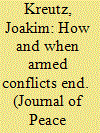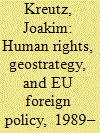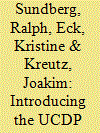|
|
|
Sort Order |
|
|
|
Items / Page
|
|
|
|
|
|
|
| Srl | Item |
| 1 |
ID:
170033


|
|
|
|
|
| Summary/Abstract |
Mistrust between conflict parties after civil war is a major hurdle to sustainable peace. However, existing research focuses on elite interactions and has not examined the trust relationship between government and rank-and-file members of armed groups, despite their importance for postconflict stability. We use the unexpected decision of the Colombian government to extradite top-level former paramilitary leaders to the United States in 2008 to identify how a peace deal reversal influences ex-combatants’ trust in government. In theory, they may lose trust for instrumental reasons, if they suffer personal costs, or for normative reasons, if they think the government is failing its commitments. Using quasi-experimental survey evidence, we find that extradition decreases trust substantially among ex-paramilitaries, but not in a comparison group of ex-guerrillas not part of the same peace deal. Even though paramilitaries are seen as particularly opportunistic, our evidence suggests that normative rather than instrumentalist considerations led to trust erosion.
|
|
|
|
|
|
|
|
|
|
|
|
|
|
|
|
| 2 |
ID:
094704


|
|
|
|
|
| Publication |
2010.
|
| Summary/Abstract |
This article presents new data on the start and end dates and the means of termination for armed conflicts, 1946-2005. These data contribute to quantitative research on conflict resolution and recurrence in three important respects: the data cover both interstate and intrastate armed conflicts, the data cover low-intensity conflicts, and the data provide information on a broad range of termination outcomes. In order to disaggregate the UCDP-PRIO Armed Conflict dataset into multiple analytical units, this dataset introduces the concept of conflict episodes, defined as years of continuous use of armed force in a conflict. Using these data, general trends and patterns are presented, showing that conflicts do not exclusively end with decisive outcomes such as victory or peace agreement but more often under unclear circumstances where fighting simply ceases. This pattern is consistent across different types of conflict, as is the finding that victories are more common in conflicts with short duration. The article then examines some factors that have been found to predict civil war recurrence and explores whether using the new dataset produces similar results. This exercise offers a number of interesting new insights and finds that the determinants for civil war recurrence identified in previous research are sensitive to alternate formulations of conflict termination data. The findings suggest that intrastate conflicts are less likely to recur after government victories or after the deployment of peacekeepers. If the previous conflict is fought with rebels aiming for total control over government or if the belligerents mobilized along ethnic lines, the risk of recurrence increases. The discrepancy in findings with previous research indicates the need for further study of conflict resolution and recurrence, for which this dataset will be useful.
|
|
|
|
|
|
|
|
|
|
|
|
|
|
|
|
| 3 |
ID:
139793


|
|
|
|
|
| Summary/Abstract |
Is foreign policy influenced by humanitarian concerns, or are concepts such as human security merely rhetoric for traditional power politics? Using a multilevel modeling technique and a unique data set of military and economic European Union (EU) intervention 1989–2008, I find that military and economic interventions by the EU are conducted in response to humanitarian atrocities but that geostrategic concerns also influence EU action. While the EU consistently is more likely to act against countries with greater civilian victimization, the size of the effect is influenced by spatial considerations. The EU is most attentive to human rights violations in non-EU European states, followed by countries in sub-Saharan Africa, while it has been least active in Asia and the Americas.
|
|
|
|
|
|
|
|
|
|
|
|
|
|
|
|
| 4 |
ID:
112781


|
|
|
|
|
| Publication |
2012.
|
| Summary/Abstract |
This article extends the Uppsala Conflict Data Program (UCDP) by presenting new global data on non-state conflict, or armed conflict between two groups, neither of which is the state. The dataset includes conflicts between rebel groups and other organized militias, and thus serves as a complement to existing datasets on armed conflict which have either ignored this kind of violence or aggregated it into civil war. The dataset also includes cases of fighting between supporters of different political parties as well as cases of communal conflict, that is, conflict between two social groups, usually identified along ethnic or religious lines. This thus extends UCDP's conflict data collection to facilitate the study of topics like rebel fractionalization, paramilitary involvement in conflict violence, and communal or ethnic conflict. In the article, we present a background to the data collection and provide descriptive statistics for the period 1989-2008 and then illustrate how the data can be used with the case of Somalia. These data move beyond state-centric conceptions of collective violence to facilitate research into the causes and consequences of group violence which occurs without state participation.
|
|
|
|
|
|
|
|
|
|
|
|
|
|
|
|
| 5 |
ID:
057926


|
|
|
| 6 |
ID:
188193


|
|
|
|
|
| Summary/Abstract |
Private military and security companies (PMSCs) and mercenaries are a common feature in civil wars, yet little systematic analysis of PMSC involvement and conflict dynamics exists. This article explores whether civil conflicts that feature PMSC forces in combat are more likely to recur. We contend that the presence of PMSCs in fighting exacerbates the postwar credible commitment problem, as belligerents will be concerned about the possibility to redeploy such forces in the future. Belligerents pay more attention to more recent and more visible information, meaning that the effects should be greatest if PMSCs feature extensively in combat and at the end of the conflict. A duration analysis of data from the Private Security Events Database and Uppsala Conflict Data Program, 1990–2014, offers robust support for these claims. Our results suggest that conflict management should consider aspects beyond the local context as risk factors for civil war recurrence.
|
|
|
|
|
|
|
|
|
|
|
|
|
|
|
|
| 7 |
ID:
137033


|
|
|
|
|
| Summary/Abstract |
When collecting data, some observations will always be hard to confidently classify in accordance with stated definitions of war, civil conflict, or political violence. This research note draws on the experiences of the Uppsala Conflict Data Program in the last decade in managing such unclear cases. After explaining the difference between unclear and non-cases, I describe the data generating process and how this uncertainty is distributed over time in the data. This exercise reveals that the 1980s may have been more conflict-filled than the 1990s, challenging arguments about the stability of the bipolar global order as well as the sudden ‘rise’ of warfare in the immediate post-Cold War era. The final section suggests different ways that researchers may use existing information regarding unclear cases as a way to conceptualize the nature of civil strife without having to engage in additional data collection.
|
|
|
|
|
|
|
|
|
|
|
|
|
|
|
|
|
|
|
|
|